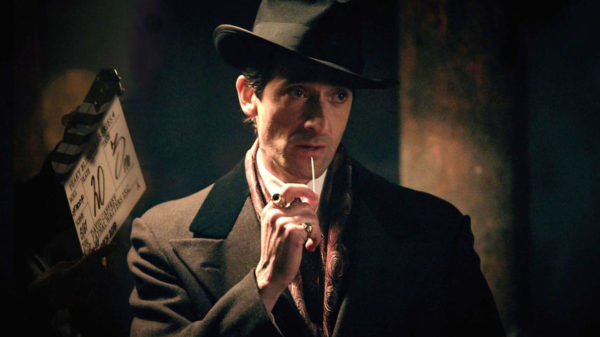In his (thoroughly excellent) book about the making of Doctor Who, ‘The Writer’s Tale’, Russell T Davies describes dialogue as ‘two monologues clashing’. ‘Everyone,’ he says, ‘is always, always thinking about themselves.’
And though that applies to every drama, it feels especially appropriate to Peaky Blinders, and especially this week. Everyone’s got an agenda, and everyone’s agenda is rubbing up against someone else’s. Conversation is conflict. Words fly like bullets, and can be just as devastating. And though we open with a big action set piece, it’s when the the guns are holstered that you feel the most damage is being done, even if you can’t quite gauge how much. Just when you think you understand someone’s motive, you learn they’re plotting on about three different levels.
Case in point: it turns out Aunt Pol wasn’t sending Tommy to his death. It was all part of a plan of his to draw out and kill Luca Changretta. The Mafia ambush is turned on its head and becomes an ambush of the Mafia, playing out like a secret multiplayer level from Call of Duty – ‘Laundry Day in Small Heath’ – as Tommy runs around, picking up and firing a variety of weapons like a man madly mashing at the gamepad, desperately trying to lower Adrien Brody’s HP. He doesn’t even get chance to knock that toothpick out of his mouth.
It’s the big action piece of the episode, but everything that comes next is far more engaging. Every conversation has weight to it. There’s not a word wasted, even when it’s repeated. ‘I got three,’ Tommy keeps saying after the shootout, hinting at a resurgence of the PTSD he suffered in the first series. The war still clings to him – a theme more pronounced than it has been for several series now – but news of Lizzie’s pregnancy seems to pull him out of it. Life among death, and all that.

Though still shellshocked, Tommy isn’t entirely divorced from a military life, as Ada finds out when the military knock on her door, in an arrest Tommy has organised as a display. The military are interested in the Commies because they fear a revolution, so Tommy’s working with the military and getting close to Jessie Eden in order to get the names of the instigators.
It means that Tommy’s brazier-lit dinner with Ms. Jessie Eden is one of those conversations where it’s obvious two monologues are clashing, and that at least one of the people taking part of it has an ulterior motive behind what they’re saying. Tommy’s looking for the winning side, Jessie’s wanting her side to win. Neither seem concerned that something sexual manages to slither its way in between.
Theirs isn’t the only conversation supported by sexual undertones. Aunt Pol shares a rabbit with Aberama, as well as a conversation that we can all see is heading in one direction. Pol said the other week that she was after a shag, although given the layers of scheming you can’t help but wonder if there’s some game playing in her kissing a man who has such a febrile alliance with the Shelbys. You can’t blame ol’ Aberama though. Who wouldn’t want to kiss a woman who holds a blade to your neck, tells you that ‘None of your knives can kill me’, then smooches you?
In an episode of memorable conversations Peaky Blinders saves its best for last; giving viewers a treat by placing its fan-favourite guest stars in one room. Adrien Brody and Tom Hardy. You’d pay good money at the cinema for that. Well, you would if you weren’t already paying a TV licence.
Luca wants Tommy dead, Alfie wants his rum sold abroad, and doesn’t particularly want Tommy in the ground. What follows is the old RTD rule writ large. They’re two people talking to get to their own conclusion. It’s less monologuing and more ‘man-ologuing’; you can smell the testosterone wafting off every beautifully crafted sentence like steam off a stallion’s flanks (Hardy’s now usual speeches are great here, though his blind man spiel sits in the shade of last week’s boxing monologue).

Peaky Blinders is an exercise in presence and posturing, but the bullish presence of Alfie Solomons also allows for that brief levity that the show occasionally allows itself. ‘A list of costs pertaining to the assassination of a dear friend,’ is a line with so much humour simply by virtue of its deadpan delivery and sincerity that you can’t help but laugh.
It is an episode of terrific verbal force – perhaps the best this series – but with a largely wordless ending set against THE BIG FIGHT, it doesn’t finish with the knockout punch that it’s clearly trying to land. The opaque outline of Alfie Solomons has the promise of a great scene next week, but there’s little threat attached to it. If Tommy can outwit five men he can surely outwit one.
It’s a cliffhanger that falls short, redeemed only by the fact that it reminds you that next week is the finale, when the stakes will be higher, guns will fire, and someone will probably die…er.
Historically, a Peaky Blinders finale tends to be a thing of shocking beauty, and after a series that has not been afraid to shock and shake (and hasn’t it gone by so quickly?!), it would be naïve to think we’re in for a last hour that won’t have some surprises. It won’t just be the monologues that are clashing.

